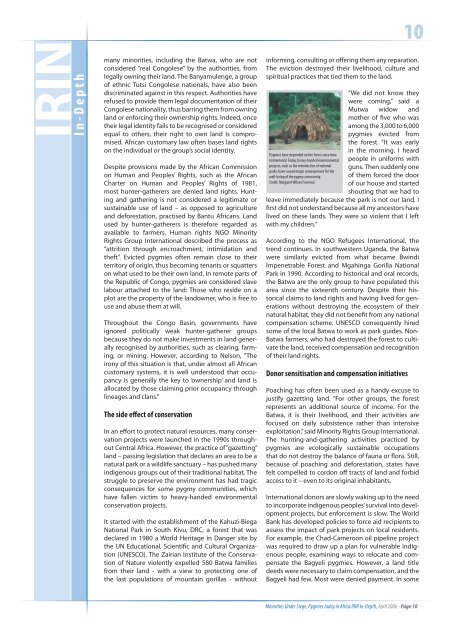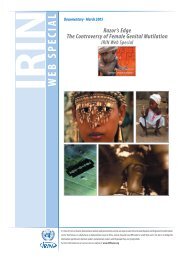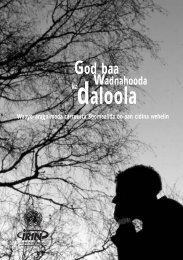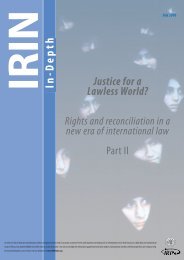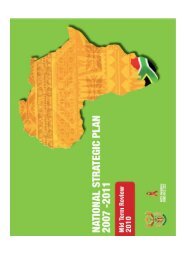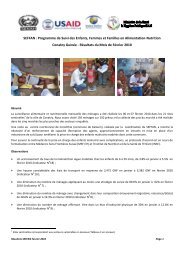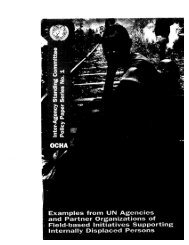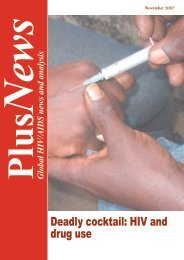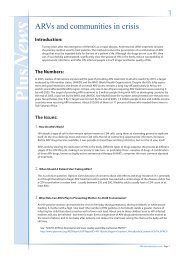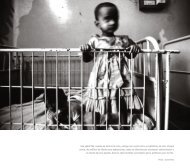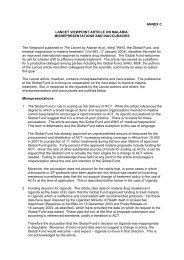Minorities Under Siege: Pygmies today in Africa - IRIN
Minorities Under Siege: Pygmies today in Africa - IRIN
Minorities Under Siege: Pygmies today in Africa - IRIN
Create successful ePaper yourself
Turn your PDF publications into a flip-book with our unique Google optimized e-Paper software.
<strong>IRIN</strong><br />
I n - D e p t h<br />
many m<strong>in</strong>orities, <strong>in</strong>clud<strong>in</strong>g the Batwa, who are not<br />
considered “real Congolese” by the authorities, from<br />
legally own<strong>in</strong>g their land. The Banyamulenge, a group<br />
of ethnic Tutsi Congolese nationals, have also been<br />
discrim<strong>in</strong>ated aga<strong>in</strong>st <strong>in</strong> this respect. Authorities have<br />
refused to provide them legal documentation of their<br />
Congolese nationality, thus barr<strong>in</strong>g them from own<strong>in</strong>g<br />
land or enforc<strong>in</strong>g their ownership rights. Indeed, once<br />
their legal identity fails to be recognised or considered<br />
equal to others, their right to own land is compromised.<br />
<strong>Africa</strong>n customary law often bases land rights<br />
on the <strong>in</strong>dividual or the group’s social identity.<br />
Despite provisions made by the <strong>Africa</strong>n Commission<br />
on Human and Peoples’ Rights, such as the <strong>Africa</strong>n<br />
Charter on Human and Peoples’ Rights of 1981,<br />
most hunter-gatherers are denied land rights. Hunt<strong>in</strong>g<br />
and gather<strong>in</strong>g is not considered a legitimate or<br />
susta<strong>in</strong>able use of land – as opposed to agriculture<br />
and deforestation, practised by Bantu <strong>Africa</strong>ns. Land<br />
used by hunter-gatherers is therefore regarded as<br />
available to farmers. Human rights NGO M<strong>in</strong>ority<br />
Rights Group International described the process as<br />
“attrition through encroachment, <strong>in</strong>timidation and<br />
theft”. Evicted pygmies often rema<strong>in</strong> close to their<br />
territory of orig<strong>in</strong>, thus becom<strong>in</strong>g tenants or squatters<br />
on what used to be their own land. In remote parts of<br />
the Republic of Congo, pygmies are considered slave<br />
labour attached to the land: Those who reside on a<br />
plot are the property of the landowner, who is free to<br />
use and abuse them at will.<br />
Throughout the Congo Bas<strong>in</strong>, governments have<br />
ignored politically weak hunter-gatherer groups<br />
because they do not make <strong>in</strong>vestments <strong>in</strong> land generally<br />
recognised by authorities, such as clear<strong>in</strong>g, farm<strong>in</strong>g,<br />
or m<strong>in</strong><strong>in</strong>g. However, accord<strong>in</strong>g to Nelson, “The<br />
irony of this situation is that, under almost all <strong>Africa</strong>n<br />
customary systems, it is well understood that occupancy<br />
is generally the key to ‘ownership’ and land is<br />
allocated by those claim<strong>in</strong>g prior occupancy through<br />
l<strong>in</strong>eages and clans.”<br />
The side effect of conservation<br />
In an effort to protect natural resources, many conservation<br />
projects were launched <strong>in</strong> the 1990s throughout<br />
Central <strong>Africa</strong>. However, the practice of “gazett<strong>in</strong>g”<br />
land – pass<strong>in</strong>g legislation that declares an area to be a<br />
natural park or a wildlife sanctuary – has pushed many<br />
<strong>in</strong>digenous groups out of their traditional habitat. The<br />
struggle to preserve the environment has had tragic<br />
consequences for some pygmy communities, which<br />
have fallen victim to heavy-handed environmental<br />
conservation projects.<br />
It started with the establishment of the Kahuzi-Biega<br />
National Park <strong>in</strong> South Kivu, DRC, a forest that was<br />
declared <strong>in</strong> 1980 a World Heritage <strong>in</strong> Danger site by<br />
the UN Educational, Scientific and Cultural Organization<br />
(UNESCO). The Zairian Institute of the Conservation<br />
of Nature violently expelled 580 Batwa families<br />
from their land - with a view to protect<strong>in</strong>g one of<br />
the last populations of mounta<strong>in</strong> gorillas - without<br />
10<br />
<strong>in</strong>form<strong>in</strong>g, consult<strong>in</strong>g or offer<strong>in</strong>g them any reparation.<br />
The eviction destroyed their livelihood, culture and<br />
spiritual practices that tied them to the land.<br />
<strong>Pygmies</strong> have depended on the forest s<strong>in</strong>ce time<br />
immemorial. Today, heavy-handed environmental<br />
projects, such as the <strong>in</strong>troduction of national<br />
parks, have caused tragic consequences for the<br />
well-be<strong>in</strong>g of the pygmy community.<br />
Credit: Margaret Wilson/Survival<br />
“We did not know they<br />
were com<strong>in</strong>g,” said a<br />
Mutwa widow and<br />
mother of five who was<br />
among the 3,000 to 6,000<br />
pygmies evicted from<br />
the forest. “It was early<br />
<strong>in</strong> the morn<strong>in</strong>g. I heard<br />
people <strong>in</strong> uniforms with<br />
guns. Then suddenly one<br />
of them forced the door<br />
of our house and started<br />
shout<strong>in</strong>g that we had to<br />
leave immediately because the park is not our land. I<br />
first did not understand because all my ancestors have<br />
lived on these lands. They were so violent that I left<br />
with my children.”<br />
Accord<strong>in</strong>g to the NGO Refugees International, the<br />
trend cont<strong>in</strong>ues. In southwestern Uganda, the Batwa<br />
were similarly evicted from what became Bw<strong>in</strong>di<br />
Impenetrable Forest and Mgah<strong>in</strong>ga Gorilla National<br />
Park <strong>in</strong> 1990. Accord<strong>in</strong>g to historical and oral records,<br />
the Batwa are the only group to have populated this<br />
area s<strong>in</strong>ce the sixteenth century. Despite their historical<br />
claims to land rights and hav<strong>in</strong>g lived for generations<br />
without destroy<strong>in</strong>g the ecosystem of their<br />
natural habitat, they did not benefit from any national<br />
compensation scheme. UNESCO consequently hired<br />
some of the local Batwa to work as park guides. Non-<br />
Batwa farmers, who had destroyed the forest to cultivate<br />
the land, received compensation and recognition<br />
of their land rights.<br />
Donor sensitisation and compensation <strong>in</strong>itiatives<br />
Poach<strong>in</strong>g has often been used as a handy excuse to<br />
justify gazett<strong>in</strong>g land. “For other groups, the forest<br />
represents an additional source of <strong>in</strong>come. For the<br />
Batwa, it is their livelihood, and their activities are<br />
focused on daily subsistence rather than <strong>in</strong>tensive<br />
exploitation,” said M<strong>in</strong>ority Rights Group International.<br />
The hunt<strong>in</strong>g-and-gather<strong>in</strong>g activities practiced by<br />
pygmies are ecologically susta<strong>in</strong>able occupations<br />
that do not destroy the balance of fauna or flora. Still,<br />
because of poach<strong>in</strong>g and deforestation, states have<br />
felt compelled to cordon off tracts of land and forbid<br />
access to it – even to its orig<strong>in</strong>al <strong>in</strong>habitants.<br />
International donors are slowly wak<strong>in</strong>g up to the need<br />
to <strong>in</strong>corporate <strong>in</strong>digenous peoples’ survival <strong>in</strong>to development<br />
projects, but enforcement is slow. The World<br />
Bank has developed policies to force aid recipients to<br />
assess the impact of park projects on local residents.<br />
For example, the Chad-Cameroon oil pipel<strong>in</strong>e project<br />
was required to draw up a plan for vulnerable <strong>in</strong>digenous<br />
people, exam<strong>in</strong><strong>in</strong>g ways to relocate and compensate<br />
the Bagyeli pygmies. However, a land title<br />
deeds were necessary to claim compensation, and the<br />
Bagyeli had few. Most were denied payment. In some<br />
<strong>M<strong>in</strong>orities</strong> <strong>Under</strong> <strong>Siege</strong>: <strong>Pygmies</strong> <strong>today</strong> <strong>in</strong> <strong>Africa</strong> <strong>IRIN</strong> In-Depth, April 2006 - Page 10


